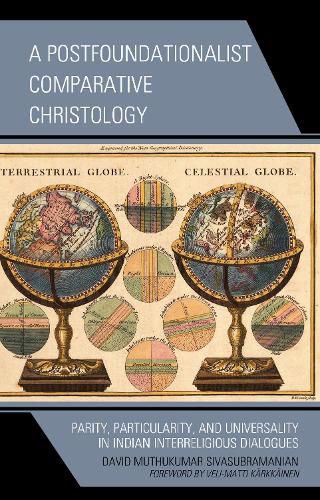Readings Newsletter
Become a Readings Member to make your shopping experience even easier.
Sign in or sign up for free!
You’re not far away from qualifying for FREE standard shipping within Australia
You’ve qualified for FREE standard shipping within Australia
The cart is loading…






Interreligious relationships are often hindered by epistemic disparity caused by the nexus between religions and state powers. To solve this problem, David Muthukumar Sivasubramanian develops a postfoundationalist epistemological framework to affirm the epistemic parity and plurality of religions while upholding their particularity and universality. Building on this postfoundationalist epistemology, a comparative Christology paradigm that uses insights from the extant comparative theology method is reformulated with a Christological focus. This model seeks to affirm the exclusive faith assertions of Christianity and the corresponding universal claims for Christ. It also sustains the particular religious identity of a comparative theologian over against any compulsion to assume hybrid identity in the interreligious cross-learning. This comparative Christology framework is exhibited through cross-learning with the Tamil Saiva Siddhanta tradition. This method is shown to affirm not only the particularity and universality of Christianity but also of the Tamil Saiva Siddhanta tradition by defining each religion’s attempt at their revealed truth as a parallel quest for truth. Thus, it facilitates dialogue across religions by securing one’s self-identity and the other’s alterity.
$9.00 standard shipping within Australia
FREE standard shipping within Australia for orders over $100.00
Express & International shipping calculated at checkout
Interreligious relationships are often hindered by epistemic disparity caused by the nexus between religions and state powers. To solve this problem, David Muthukumar Sivasubramanian develops a postfoundationalist epistemological framework to affirm the epistemic parity and plurality of religions while upholding their particularity and universality. Building on this postfoundationalist epistemology, a comparative Christology paradigm that uses insights from the extant comparative theology method is reformulated with a Christological focus. This model seeks to affirm the exclusive faith assertions of Christianity and the corresponding universal claims for Christ. It also sustains the particular religious identity of a comparative theologian over against any compulsion to assume hybrid identity in the interreligious cross-learning. This comparative Christology framework is exhibited through cross-learning with the Tamil Saiva Siddhanta tradition. This method is shown to affirm not only the particularity and universality of Christianity but also of the Tamil Saiva Siddhanta tradition by defining each religion’s attempt at their revealed truth as a parallel quest for truth. Thus, it facilitates dialogue across religions by securing one’s self-identity and the other’s alterity.